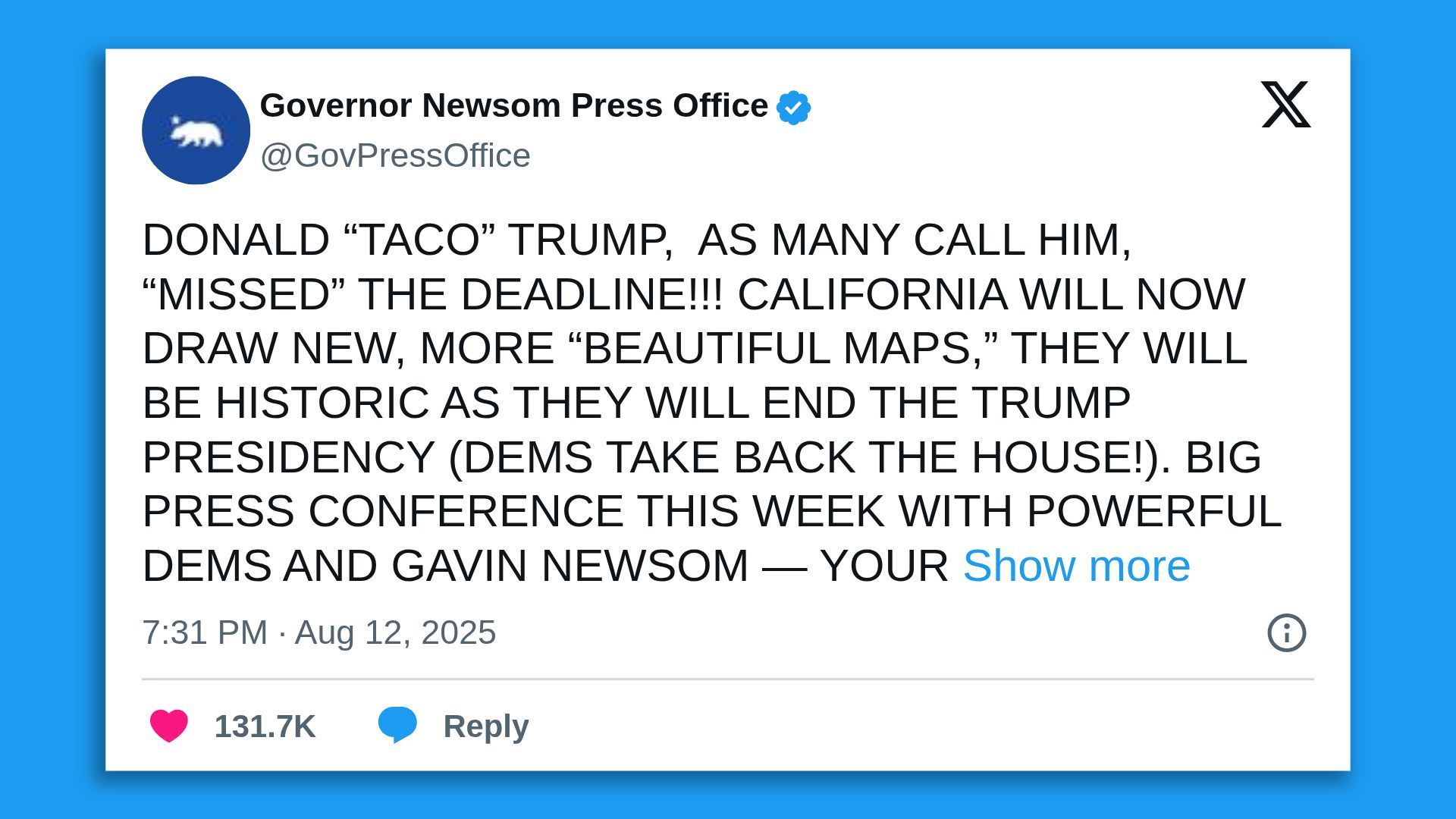Eventually I’ll get to more serious subjects. Though arguably politics is the most serious subject, because politics is about psychology and that involves how humans perceive and believe everything else. But there is a reality beneath politics (or should it be ‘beyond’), and even psychology, which is what I’m trying to get at.
- Summaries and takes on the Trump/Putin meeting in Alaska. No one thinks it went well, except for Trump and MAGA and Fox News;
- A piece about Trump’s speaking style: “many such cases”; “many people are saying this” and so on;
- Gavin Newsom mocks Trump’s full-caps posts;
- And a late Arvo Pärt piece: Symphony #4.
For the record. Trump went to Alaska this past weekend to meet Putin, to discuss the ongoing conflict in Ukraine. Trump had two goals. He got neither. He came home and declared victory, the meeting a 10 on a scale of 10. As he does.

NY Times, news analysis by Peter Baker, 16 Aug 2025 (on today’s front page): Trump Bows to Putin’s Approach on Ukraine: No Cease-Fire, Deadlines or Sanctions
Subtitle: “The net effect of the Alaska summit was to give President Vladimir V. Putin of Russia a free pass to continue his war against his neighbor indefinitely without further penalty, pending talks on a broader peace deal.”
On the flight to Alaska, President Trump declared that if he did not secure a cease-fire in Ukraine during talks with President Vladimir V. Putin of Russia, “I’m not going to be happy,” and there would be “severe consequences.”
Just hours later, he got back on Air Force One and departed Alaska without the cease-fire he deemed so critical. Yet he had imposed no consequences, and had pronounced himself so happy with how things went with Mr. Putin that he said “the meeting was a 10.”
Even in the annals of Mr. Trump’s erratic presidency, the Anchorage meeting with Mr. Putin now stands out as a reversal of historic proportions. Mr. Trump abandoned the main goal he brought to his subarctic summit and, as he revealed on Saturday, would no longer even pursue an immediate cease-fire. Instead, he bowed to Mr. Putin’s preferred approach of negotiating a broader peace agreement requiring Ukraine to give up territory.
Naturally, Trump came home and called news reports that spelled this out “fake news.” And presumably his MAGA supporters, who pay attention only to Trump and not to any mainstream news media (Fox doesn’t count), believe him. This is why the rest of us call MAGA a cult.
Example:
JMG, 17 Aug 2025: Trump: “Fake News Distorts The Truth” About Summit
Quoting a Trump post (which I will not).
\
Heather Cox Richardson’s puts things into perspective.
Letters from an American, Heather Cox Richardson: August 16, 2025
Yesterday, military personnel from the United States of America literally rolled out a red carpet for a dictator who invaded a sovereign country and is wanted by the International Criminal Court for war crimes including the stealing of children. Apparently coached by his team, Trump stood to let Russia’s president Vladimir Putin walk toward him after Putin arrived at Joint Base Elmendorf-Richardson in Anchorage, Alaska, putting Trump in a dominant position, but he clapped as Putin walked toward him. The two men greeted each other warmly.
This summit between the president of the United States and the president of Russia came together fast, in the midst of the outcry in the U.S. over Trump’s inclusion in the Epstein files and the administration’s refusal to release those files.
And the end.
The two and a half hour working lunch that was scheduled did not take place. Both men left Alaska within an hour.
Speaking with European leaders in a phone call from Air Force One on his way home from the summit, Trump said that Putin rejected the idea of a ceasefire and insisted that Ukraine cede territory to Russia. He also suggested that a coalition of the willing, including the U.S., would be required to provide security guarantees to Ukraine. But within hours, Trump had dropped his demand for a ceasefire and instead echoed Putin’s position that negotiations for a peace agreement should begin without one.
In an interview with Fox News Channel personality Sean Hannity after the meeting, Trump said he would not impose further sanctions on Russia because the meeting with Putin had gone “very well.” “Because of what happened today, I think I don’t have to think about that now,” Trump told Hannity. “I may have to think about it in two weeks or three weeks or something, but we don’t have to think about that right now.”
\\\
This is apropos.

NY Times, guest essay by Adam Aleksic (an American linguist), 17 Aug 2025: The Insidious Creep of Trump’s Speaking Style
“Many such cases.” “Many people are saying this.”
You may recognize these phrases as “Trumpisms” — linguistic coinages of President Trump — but they’ve also become ingrained in our collective vocabulary. Since they became popular as memes during his first presidential campaign, we have begun using them, first sardonically, and then out of habit.
(Of course, there never are “many cases” or “many people” who are saying this or that, that Trump or anyone else can provide. He’s a con artist.)
Mr. Trump’s impact reaches well beyond just two phrases. Since he helped popularize “sad!” as an interjection, I regularly hear people use it that way as well; something similar is in effect with “frankly,” “fake news” and the discourse marker “believe me” at the end of a sentence. All of these terms were buoyed by Mr. Trump’s usage, turned into ironic callbacks (including by his supporters), and then incorporated into everyday speech. In fact, Mr. Trump may have a greater impact on the English language than any president in the history of the United States, maybe ever.
Wait for it–
That last sentence borrowed the grammatical structure of a 2016 meme where Mr. Trump described NAFTA as “the worst trade deal in the history of trade deals, maybe ever.” Since then, the joke has become a kind of syntactic skeleton called a phrasal template: a grammatical place holder with empty slots to fill. Now any concept can be loaded into the template of “[superlative] X in/on the Y in the history of Z, maybe ever” — making it easier to apply to new scenarios and outlive the original meme.
My comment: real people do not talk this way. Intelligent people do not talk this way. The essay concludes:
Mr. Trump’s ideas begin as ridiculous and are easily parodied on the internet — at this point, they’re already affecting our head space. When those parodies become a subconscious part of language, their overt power is diluted but the underlying idea remains there, continuing to subtly represent his presence.
The fact that we’re talking like Donald Trump could mean that we’re starting to think like him as well.
Others? Offhand, “Like nothing ever seen before.” But wait — there’s a Wikipedia page about it! Rhetoric of Donald Trump.
\
I should note that over the past week California governor Gavin Newsom has been mocking Trump’s tweets by posting outrageous, full-caps, tweets of his own. The right complains, but not too much… Example at Axios: Newsom mocks Trump’s social media in a flurry of redistricting posts. I’ll link this one for now.

\\\
This piece, from 2008, is very beautiful. In a subdued, almost minimalist way.
It was commissioned for performance in Los Angeles.






